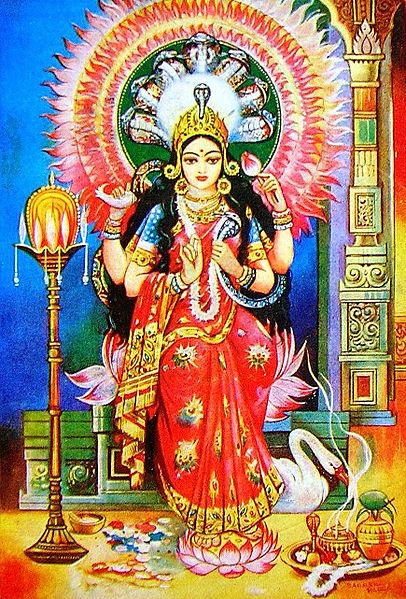Manasa Devi


Manasa Devi, is a Hindu folk goddess of snakes, worshipped mainly in Bengal and other parts of North and northeastern India, chiefly for the prevention and cure of snakebite and also for fertility and prosperity. Manasa Devi is the sister of Vasuki, king of Nāgas (snakes) and wife of sage Jagatkāru (Jaratkāru). She is also known as Vishahara (the destroyer of poison), Nityā (eternal) and Padmavati.
Her myths emphasize her bad temper and unhappiness, due to rejection by her father Shiva and her husband, and the hatred of her stepmother, Chandi (Shiva's wife, identified with Parvati in this context). In some scriptures, sage Kashyapa is considered to be her father, rather than Shiva. Manasa is depicted as kind to her devotees, but harsh to people who refused to worship her. Denied full godhead by her mixed parentage, Manasa’s aim was to fully establish her authority as a goddess and to acquire steadfast human devotees.
Originally a Adivasi (tribal) goddess, Manasa Devi was accepted in the pantheon worshipped by Hindu lower caste groups. Later, she was included in higher caste Hindu pantheon, where she is now regarded as a Hindu goddess rather than a tribal one. As a Hindu goddess, she was recognized as a daughter of sage Kashyapa and Kadru, the mother of all Nāgas. By the 14th century, Manasa was identified as the goddess of fertility and marriage rites and was assimilated into the Shaiva pantheon as a relative of Shiva. Myths glorified her by describing that she saved Shiva after he drank poison, and venerated her as the "remover of poison". Her popularity grew and spread to Southern India, and her cult began to rival Shaivism itself. As a consequence, stories attributing Manasa's birth to Shiva emerged and ultimately Shaivism adopted this indigenous goddess into the Brahmanical tradition of mainstream Hinduism.